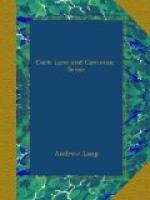Our only conclusion is that the psychological conditions which begat the ancient narratives produce the new legends. These surprise us by the apparent good faith in marvel and myth of many otherwise credible narrators, and by the coincidence, accidental or designed, with old stories not generally familiar to the modern public. Do impostors and credulous persons deliberately ‘get up’ the subject in rare old books? Is there a method of imposture handed down by one generation of bad little girls to another? Is there such a thing as persistent identity of hallucination among the sane? This was Coleridge’s theory, but it is not without difficulties. These questions are the present results of Comparative Psychological Research.
HAUNTED HOUSES
Reginald Scot on Protestant expulsion of Ghosts. His boast premature. Savage hauntings. Red Indian example. Classical cases. Petrus Thyraeus on Haunted Houses. His examples from patristic literature. Three species of haunting spirits. Demons in disguises. Hallucinations, visual, auditory, and tactile. Are the sounds in Haunted Houses real or hallucinatory? All present do not always hear them. Interments in houses to stop hauntings. Modern example. The Restoration and Scepticism. Exceptional position of Dr. Johnson. Frequency of Haunted Houses in modern Folklore. Researches of the S. P. R. Failure of the Society to see Ghosts. Uncertain behaviour of Ghosts. The Society need a ‘seer’ or ‘sensitive’ comrade. The ‘type’ or normal kind of Haunted Houses. Some natural explanations. Historical continuity of type. Case of Sir Walter Scott. A haunted curacy. Modern instances. Miss Morton’s case: a dumb ghost. Ghost, as is believed, of a man of letters. Mr. Harry’s ghost raises his mosquito curtains. Columns of light. Mr. Podmore’s theory. Hallucinations begotten by natural causes are ‘telepathically’ transferred, with variations, to strangers at a distance. Example of this process. Incredulity of Mr. Myers. The spontaneous phenomena reproduced at ‘seances’. A ghost who followed a young lady. Singular experience of the writer in Haunted Houses. Experience negative. Theory of ’dreams of the dead’. Difficulties of this theory; physical force exerted in dreams. Theory of Mr. James Sully. His unscientific method and carelessness as to evidence. Reflections.




